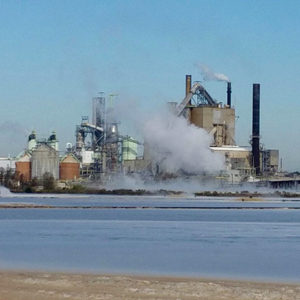JPS Industries
JPS Industries: Engineered Solutions for Superior Wastewater Lagoon Performance
For nearly 60 years, JPS Industries has been synonymous with excellence in wastewater lagoon treatment, crafting and installing the world's most durable and effective baffle curtains. Our commitment to quality, innovation, and longevity is unmatched, with many JPS baffle systems still exceeding expectations after decades of service. Beyond custom lagoon baffles, we offer a comprehensive suite of industrial services and dredging. Our product line further enhances the efficiency and performance of wastewater lagoons.
JPS has provided solutions for a diverse range of industries and municipalities, including pulp and paper mills, oil and gas refineries, wastewater treatment facilities, food processing plants, chemical facilities, manufacturing operations, and power generation plants. We understand that treatment lagoons face constant exposure to the elements, placing immense stress on baffle systems. JPS baffle curtains are meticulously engineered to distribute stress evenly throughout the structure, effectively withstanding the rigors of environmental changes. This dedication to quality and durability is why JPS offers an industry-leading warranty, unmatched by any other manufacturer. Our relentless pursuit of precision and longevity has resulted in numerous patented design innovations that maximize the efficiency and lifespan of JPS lagoon baffles. In fact, JPS has designed and installed an astounding 75% of the baffles currently used in paper mills across Canada and the United States.
A Legacy of Innovation and Commitment
"Not just any, but the finest constructed baffles in the world!" This unwavering declaration from Joe Santamaria Sr., the founder of JPS, encapsulates the company's core philosophy. "Our baffle curtains are so well made, some have been in service for over 30 years, even under extreme conditions!"
Before pioneering baffle innovations and establishing many of today's industry standards, JPS tackled a different kind of challenge: oil spills. The U.S. Navy, grappling with severe oil pollution in New England harbors, sought a solution. As a civilian contractor, Joe Santamaria Sr. answered the call. This opportunity presented both a challenge and a chance to travel. Initially, the market lacked effective oil containment products. "We improvised with logs, fire hoses, anything we could find to contain the oil," Joe recalls. Through this hands-on experience, it became clear that specialized oil booms were essential. In the spring of 1964, JPS began its journey by experimenting and manufacturing dedicated oil booms.
A pivotal moment arrived in 1969 when a Norwegian engineer sought collaboration. Norway faced similar oil boom challenges, and this partnership led to the development of the first truly effective oil boom. "It featured independent flotation, continuous bottom weights, and numerous other advancements that are still used today," Joe explains. "It was like a robust fishnet, and the business took off!"
The Exxon Valdez oil spill further solidified JPS's reputation. The Bureau of Land Management called upon JPS to lead the initial cleanup efforts. "We deployed booms to Alaska, and Exxon gave us open purchase orders," Joe recounts. "We enlisted local fishermen and processing ships, who were stranded due to the spill, to deploy the booms. The Fish and Game Department also tasked us with installing separate booms to protect salmon streams – it was quite an adventure."
JPS's expertise soon extended to municipal and commercial applications. In South Carolina, the company developed a deep boom system for baffling lagoon systems, designed to circulate wastewater effectively before release. "It worked beautifully, and we were overwhelmed with demand!" Joe remarks. Today, JPS baffles are deployed globally in both municipal and industrial settings.
JPS Industries remains family-owned and operated, with many long-tenured employees who have witnessed the company's evolution. Karl Syfrett shares, "We're like one big family. The best part is that when we have ideas, the bosses listen. That's how we create products that truly last."


